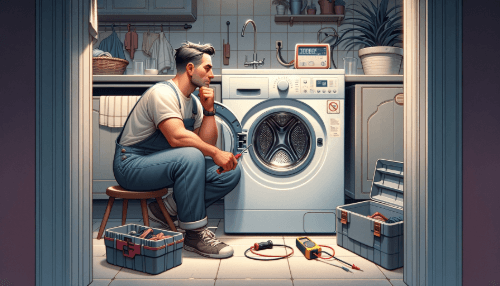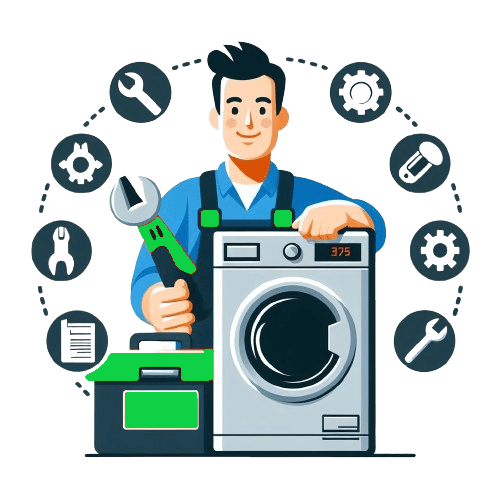Blog
If you’ve ever had a washing machine that hums but won’t start, you know how frustrating it can be. You load up your machine with dirty clothes and detergent, hit the start button, and wait for the cycle to begin. But instead of hearing the comforting sound of water rushing into the tub, all you hear is a low hum. What’s going on?
There are a few different reasons why your washing machine might be humming but not starting. Some of the most common causes include a faulty lid switch, a malfunctioning motor, or a broken belt. In this article, I’ll walk you through the steps you can take to diagnose and fix the problem, so you can get your washing machine up and running again as quickly as possible.

As someone who has worked with washing machines for years, I have encountered many cases where the machine hums but won’t start. Here are some common causes of this issue:
One of the most common causes of a humming washing machine is a faulty motor. The motor is responsible for powering the drum and if it is not functioning properly, the machine will not start. In some cases, the motor may only need a simple repair, such as replacing a broken belt. However, if the motor is completely burnt out, it will need to be replaced.
The capacitor is an important component of the washing machine’s motor. It stores electrical energy and provides the motor with the initial boost it needs to start spinning. If the capacitor is broken or faulty, the motor will not receive the necessary power to start and will only produce a humming sound.
Another reason why your washing machine may hum but not start is due to a clogged drain pump. This pump is responsible for removing water from the machine during the spin cycle. If it becomes clogged with debris or foreign objects, it can cause the machine to stop working and only produce a humming sound.
In summary, a humming washing machine that won’t start can be caused by a faulty motor, broken capacitor, or clogged drain pump. If you encounter any of these issues, I recommend seeking the help of a professional technician to properly diagnose and fix the problem.
If your washing machine hums but won’t start, there are a few troubleshooting steps you can take to identify and fix the problem. Here are some things to check:
The first thing to check is the power supply. Make sure the washing machine is properly plugged in and that the outlet is functioning correctly. If the outlet is not working, try plugging the washing machine into a different outlet. If the washing machine still won’t start, check the circuit breaker to see if it has tripped. If it has, reset it and try starting the washing machine again.
If the power supply is not the issue, the next thing to check is the door lock. If the door is not properly closed or the lock is damaged, the washing machine will not start. Inspect the door lock to make sure it is functioning correctly. If it is damaged, replace it.
The start capacitor is responsible for providing the initial boost of power to the motor. If the start capacitor is faulty, the washing machine may hum but not start. To test the start capacitor, use a multimeter to check its continuity. If it is not working properly, replace it.
If the power supply, door lock, and start capacitor are all functioning properly, the issue may be with the motor or bearings. A faulty motor or bearings can cause the washing machine to hum but not start. To evaluate the motor and bearings, remove the belt from the motor and turn the motor by hand. If it is difficult to turn or makes unusual noises, it may be time to replace the motor or bearings.
By following these troubleshooting steps, you can identify and fix the issue causing your washing machine to hum but not start.
If your washing machine is humming but won’t start, there are a few DIY repair tips you can try before calling a professional. Here are some steps you can take to troubleshoot and fix the issue:
If your washing machine is making a humming noise but won’t start, it could be due to a broken or worn out drive belt. To replace the drive belt, follow these steps:
Another reason why your washing machine is humming but won’t start could be due to a drainage blockage. To clear any blockages, follow these steps:
If your washing machine is still humming but won’t start, try resetting it. Here’s how:
In conclusion, these DIY repair tips can help you troubleshoot and fix a washing machine that is humming but won’t start. However, if these tips don’t work, it’s best to call a professional for further assistance.
As a professional repair technician, I have encountered numerous cases where washing machines hum but won’t start. Here are some tips to help you diagnose and fix the problem.
If you have tried all the troubleshooting steps and your washing machine still won’t start, it might be time to call a technician. A professional technician can diagnose and fix the problem quickly and efficiently. Here are some signs that you should call a technician:
The cost of repairing a washing machine that hums but won’t start can vary depending on the cause of the problem. Here are some common repair costs that you can expect:
In conclusion, if your washing machine is humming but won’t start, there are several troubleshooting steps that you can try. However, if these steps don’t work, it might be time to call a professional technician. The expected repair costs can vary depending on the cause of the problem, but knowing what to expect can help you make an informed decision about whether to repair or replace your washing machine.
As a washing machine owner, it’s important to perform regular preventive maintenance to ensure it operates efficiently and lasts for years to come. Here are some tips to help you keep your washing machine humming smoothly.
Cleaning your washing machine regularly can help prevent issues such as clogs, odors, and mold growth. To clean your washing machine, follow these steps:
Using your washing machine properly can also help prevent issues. Here are some tips to keep in mind:
Regularly inspecting your washing machine can help you catch issues early on and prevent bigger problems. Here are some things to look for:
By following these preventive maintenance tips, you can help ensure your washing machine stays in top condition and avoids the frustrating issue of humming but not starting.
When a washing machine hums but won’t start, it’s important to understand the different types of noises it may make. By identifying the specific noise, you can better diagnose the problem and determine the appropriate solution.
Here are some common washer noises and what they may indicate:
By understanding the different types of washer noises, you can better diagnose and solve the problem. If you’re unsure about the cause of the noise or how to fix it, it’s always best to consult a professional.
As a professional in the field, I strongly advise taking some safety precautions before attempting to fix a washing machine that hums but won’t start. Here are a few tips to keep in mind:
By following these safety precautions, you can ensure that you stay safe while working on your washing machine. Remember, if you are unsure about anything or feel uncomfortable working on the machine, it’s always best to call a professional.
As a consumer, it’s important to know the warranty and support information when purchasing a washing machine. Most manufacturers provide a warranty that covers parts and labor for a certain period of time. It’s important to read the warranty information carefully to understand what is covered and for how long.

This issue can be caused by a variety of factors, including a jammed pump, a faulty lid switch, a malfunctioning timer or control board, or electrical issues. It’s important to check these components to diagnose the exact cause.
Always unplug the washing machine before beginning any troubleshooting. Check for obvious issues like blocked filters or jammed parts. If you’re comfortable, inspect the lid switch, timer, and pump. However, if you’re unsure, it’s best to consult a professional.
Yes, a power surge can damage the washing machine’s electrical components, leading to issues like humming without starting. If you suspect a power surge, inspect the control board and timer for damage, but be aware that these are more complex repairs.
This depends on the age of your washing machine and the cost of the repair. If it’s a simple fix like a clogged filter or a faulty lid switch, repair is usually cost-effective. However, if the machine is old and the repair is complex or expensive, it might be more economical to replace it.
If you have concerns about your appliance’s performance, contact the professionals at ARNI Services, Appliance Repair, for a thorough diagnosis and repair service. – you can’t put a price tag on peace of mind.